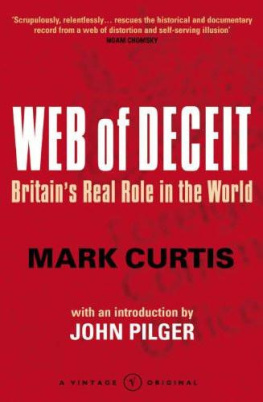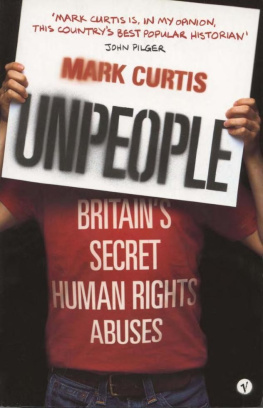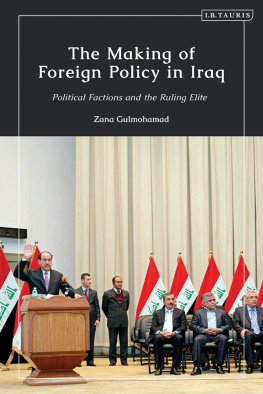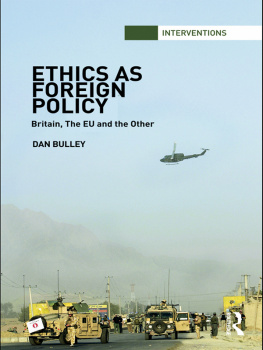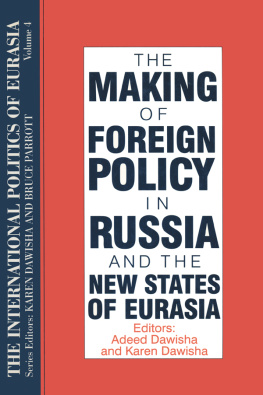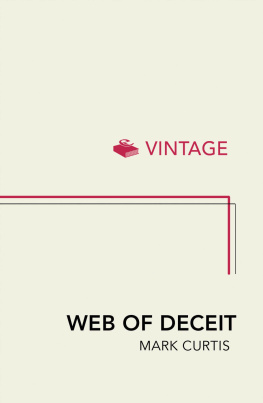WEB OF DECEIT
Mark Curtis is a former Research Fellow at the Royal Institute of International Affairs (Chatham House) and has written extensively on British and US foreign policies. His books include The Ambiguities of Power: British Foreign Policy since 1945 (Zed, London, 1.9.95); The Great Deception: Anglo-American Power and World Order (Pluto, London, 1998); and Trade for Life: Making Trade Work for Poor People (Christian Aid, London, 2001). He has worked in the field of international development for the past ten years. His website address is: www.markcurtis.info
This eBook is copyright material and must not be copied, reproduced, transferred, distributed, leased, licensed or publicly performed or used in any way except as specifically permitted in writing by the publishers, as allowed under the terms and conditions under which it was purchased or as strictly permitted by applicable copyright law. Any unauthorised distribution or use of this text may be a direct infringement of the author's and publisher's rights and those responsible may be liable in law accordingly.
ISBN 9781407071640
Version 1.0
www.randomhouse.co.uk
Published by Vintage 2003
8 10 9 7
Copyright Mark Curtis 2003
Foreword copyright John Pilger 2003
Mark Curtis has asserted his right under the Copyright, Designs and Patents Act 1988 to be identified as the author of this work
This electronic book is sold subject to the condition that it shall not by way of trade or otherwise, be lent, resold, hired out, or otherwise circulated without the publisher's prior consent in any form other than that in which it is published and without a similar condition including this condition being imposed on the subsequent purchaser
First published in Great Britain by
Vintage, 2003
Vintage
Random House, 20 Vauxhall Bridge Road, London sw1V 2SA
Random House Australia (Pty) Limited
20 Alfred Street, Milsons Point, Sydney,
New South Wales 2061, Australia
Random House New Zealand Limited
18 Poland Road, Glenfield,
Auckland 10, New Zealand
Random House South Africa (Pty) Limited
Endulini, 5A Jubilee Road, Parktown 2193, South Africa
Random House UK Limiced Reg. No. 954009
www.randomhouse.co.uk
A CIP catalogue record for this book
is available from the British Library
ISBN: 9781407071640
Version 1.0
LIST OF
ABBREVIATIONS
| AIOC | Anglo-Iranian Oil Company (later BP) |
| ANC | African National Congress |
| BIOT | British Indian Ocean Territory |
| DFID | Department for International Development |
| DTI | Department of Trade and Industry |
| FAC | Foreign Affairs Committee (House of Commons) |
| GATS | General Agreement on Trade in Services |
| HRW | Human Rights Watch |
| IMF | International Monetary Fund |
| MAI | Multilateral Agreement on Investment |
| NATO | North Atlantic Treaty Organisation |
| NGO | Non Governmental Organisation |
| PKI | Indonesian Communist Party |
| TNC | Transnational Corporation |
| TRIPS | Trade-related intellectual property rights |
| UNCTAD | United Nations Conference on Trade and Development |
| UNDP | United Nations Development Programme |
| UNHCR | United Nations High Commissioner for Refugees |
| WTO | World Trade Organisation |
FOREWORD
BY JOHN PILGER
Mark Higson was the Iraq Desk Officer at the British Foreign Office in 1989. In a setting the great satirist Dennis Potter might have conjured, Higson sat behind a little Iraqi flag and directly opposite the Iran Desk man, who sat behind the Ayatollah's flag. When I met him several years later, Higson described to me how ministers and officials systematically lied to parliament about illegal shipments of arms to Iraq. 'The draft letters I wrote for various ministers,' he said, 'were saying that nothing had changed, the embargo on the sale of British arms to Iraq was the same.'
'Was that true?' I asked.
'No, it wasn't true.'
'And your superiors knew it wasn't true?'
'Yes. If I was writing a draft reply to a letter from an MP for Mr Mellor or Mr Waldegrave (then Foreign Office ministers) I wrote the agreed line. But they knew things had changed. I also wrote replies to go to members of the public who were concerned about the gassing of the Kurds at Halabja by Saddam Hussein and wanted to know what the government was doing about it. A lot of MPs and members of the public thought the 340 million trade credits we gave to Iraq [following the Halabja atrocity] was absolutely disgusting.'
I said, 'You and your colleagues at the Foreign Office knew that British weapons were going illegally to Iraq. Is that correct?'
'Oh yes, yes. We were quite well aware that Jordan was being used [as the way into Iraq]... you see, Iraq was regarded as the big prize.'
'So how much truth did the public get?'
'The public got as much truth as we could squeeze out, given that we told downright lies.'1
At the 1994 public inquiry into the scandal of illegal arms sales to Iraq, Higson's honesty was commended by Lord Justice Scott, the chairman, a rare accolade. Britain's foreign policy establishment, Higson told the tribunal, 'is a culture of lying'.
Tim Laxton, an auditor assisting the Scott Inquiry and one of the few to hear almost all the evidence, believes that had Scott's terms of reference allowed him to conduct a truly open and wide-ranging investigation, 'hundreds' would have faced criminal investigation. 'They would include', he said, 'top political figures, very senior civil servants from the Foreign Office, the Ministry of Defence, the Department of Trade and Industry ... the top echelon of the British government.'
The glimpse that Scott and Higson gave us of the ruthless and mendacious nature of great power was unprecedented. British imperialism has been second to none in projecting itself as benign, wise and essentially truthful, even a gift to humanity. With every generation, it seems, come new mythologists. That the opposite is true may shock some people. 'A truth's initial commotion', wrote the American sage Dresden James, 'is directly proportional to how deeply the lie was believed. It wasn't the world being round that agitated people, but that the world wasn't flat. When a well-packaged web of lies has been sold to the masses over generations, the truth will seem utterly preposterous and its speaker a raving lunatic.'
Mark Curtis' brilliant, exciting and deeply disturbing book unwraps the whole package, layer by layer, piece by piece. Not since Noam Chomsky's Deterring Democracy has there been such a disclosure, whose publication could not be more timely. In the aftermath of September nth, 2001, the truths told in the following pages will seem far from preposterous to a great many people, now made aware of the rapaciousness and cynicism of power politics by current events. They see clearly the exploitation of September nth by George W. Bush's gang and by Tony Blair and the unprovoked aggression against Iraq. At the time of writing these words, the claim of Blair and Bush of links between Iraq and Al Qaida, as justification for an attack on Iraq, is openly derided, having been contradicted by their own intelligence agencies. This was superceded by Blair's 'moral argument' for the attack, which is scorned by a significant section of the public, aware of the hundreds of thousands of deaths caused by the Anglo-American driven embargo of Iraq. Moreover, Blair's messianic promise to 'reorder the world' is increasingly referred to as imperialism: until recently, a word virtually struck from the dictionary and declared unspeakable by conservatives and liberals alike.

